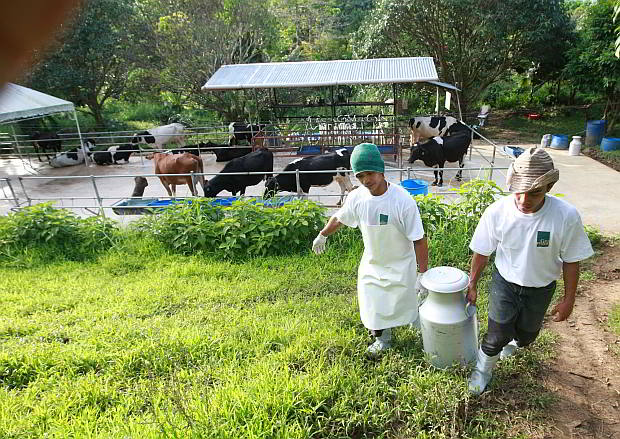Dairy farm told to install wastewater treatment facility to avert pollution
The Cebu City Environment and Natural Resources Office (Cenro) wants a privately-owned farm in barangay Guba to install a wastewater treatment facility to avert pollution in the Guba River.
“The City through Cenro is willing to help and assist them in installing a treatment facility in their area as long as they will be shouldering the cost,” said Cenro head Randy Navarro.
Navarro, in a report submitted to the City Council, observed that although a concrete barrier and catchment basin have already been installed in the facility of Yuvienco Farm for its wastewater, it’s still not enough.
The Management of Yuvienco Farm is yet to receive and act on the report and recommendation from Cenro.
Residents’ concern
Navarro said the management has been cooperating with them since their first visit in the area last December after residents of Guba Proper sent a petition letter to Guba barangay officials alleging that animal waste coming from the farm has resulted in the pollution of Guba River.
“The residents feared that the present condition of the river will affect the health of their children, senior citizens and pregnant women,” read a September 11, 2013 resolution from the Guba barangay council which was referred to the Department of Environment and Natural Resources (DENR), the Office of the Mayor and the City Council.
An ocular inspection conducted by Cenro on the first week of December showed that wastewater flows directly to a small creek, located within the farm’s compound, causing contamination. The creek is connected to the Guba River.
A second visit by Cenro during the last week of December showed significant efforts to minimize seepage of wastewater into the creek and eventually the river.
“They established a concrete barrier so as not to allow effluent from flowing directly into the creek. The wastewater is instead diverted into a catch basin, with an estimated volume capacity of 150 cubic meters for sedimentation,” Navarro said.
Navarro said the management is also using the wastewater as fertilizer for a plantation of Napier grass which is also used to feed around 200 milking cows in the farm.
Yuvienco produces cow’s milk which is then processed elsewhere for commercial sale.
However, Navarro said in a farm the size of Yuviengco, a 150-cubic meter impounding basin will approximately be filled in just one day. He also noted that spillovers from the impounding basin as well as from the Napier grass plantation might still eventually seep through the ground and end up in the river.
Aside from installing a treatment facility in the compound, other recommendations from Cenro include: proper collection of the cake or sludge for composting or waste to energy initiatives, mitigation of foul odor emission from cows’ waste by using organic deodorizer and constant cleaning of the cows’ stables using recycled water from the treatment facility.
With a treatment plant, Navarro said wastewater can be recycled for other uses or it can be safely released to the creek and into the river without any harmful chemicals and pollutants.
“It is also recommended that Yuvienco Farm managers should cooperate with the office of the Cenro, the City Mayor’s Office, and the EMB (Environmental Management Bureau) DENR 7 for their proper guidance and compliance,” read the Cenro’s report
“Rest assured that these offices will be coordinating and will be extending help of whatever remedial solutions of the farm in order to carryout sustainable programs towards clean environment of our city,” the report further read.
During its regular session last week, the City Council has referred Cenro’s report to the committee on environment which is headed by Councilor Nida Cabrera.
The DENR-EMB 7 will also be sending a team from their pollution control division to investigate the allegations tomorrow, Tuesday.
“We will conduct an investigation on the water pollution allegedly attributed to the Yuvienco Farm. Part of the probe will be collecting water samples from the river whether they pass the standards for water quality,” said Eddie Llamedo, DENR information officer, in a text message to Cebu Daily News.
FARM OWNER
An April 10, 2011 article in Cebu Daily News featured Minerva “Minnie” Sotto Yuvienco, a fashion designer and owner of Best of New York boutique, which said she inherited a six-hectare farm from her father in barangay Guba, Cebu City.
“Minnie had heard about the dairy business from other farmers in Guba and was immediately interested to try her hand in a like venture. She attended seminars, did Internet research and got involved in the Cebu Federation of Dairy Cooperatives. She attended her first Dairy Congress in Camarines Sur in May 2009,” read part of the article.
The article further revealed that most of their milk products are sold to the Cebu Federation of Dairy Cooperatives while the rest is sold from her residence in Paradise Village in Banilad, Cebu City.
Disclaimer: The comments uploaded on this site do not necessarily represent or reflect the views of management and owner of Cebudailynews. We reserve the right to exclude comments that we deem to be inconsistent with our editorial standards.

